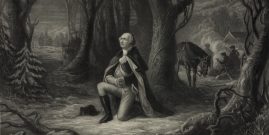The departure from ideals has very substantial costs that create a presumption against it in the absence of compelling evidence of its necessity.
The Enlightenment, Liberty, and Tradition
In A Culture of Growth: The Origins of the Modern Economy Joel Mokyr has located the source of the industrial revolution in the culture of the Enlightenment. The Enlightenment prioritized the idea of human progress. As a result, people began to think constantly of finding material in the world to make new technologies for human betterment. The Enlightenment also replaced more scholastic modes of thought with scientific method. As a result, people began intensively to test both new theories to see if they explained the world and new mechanisms to see how they would move the world. As a consequence, the Western economy began to grow at a rate never before seen in history.
A Culture for Growth is a wonderful book to which I cannot do justice in a short post. Mokyr is in equal measures a great intellectual historian and a great economist. He sees the cultural change of the Enlightenment as transforming the incentives for economic and intellectual activity. It removed taboos that impeded progress and created a market where the best new ideas rapidly gained a large market share of elite approval. This book is welcome for many reasons, but not least because it is a blow to tedious, tendentious, and false political correctness about the roots our our prosperity. The Enlightenment was indeed key to material progress that helped the least well off, first in the West and now more broadly throughout the globe. And yes, it was the product almost entirely of dead white men, and relatively wealthy ones at that.
Although this is not his focus, I believe Mokyr’s book also establishes the crucial link between the levers of the Enlightenment and the growth of liberty. If progress is possible, it is worth granting people liberty to make it happen, even though the exercise of liberty will upset some and indeed lead to intermittent social conflict. The scientific method also undermined worldly authority that was based on religious or metaphysical claims. Authority must be earned by delivering the goods.
If the Enlightenment boosts liberty, it also tends to devalue tradition. Tradition valorizes the past. But progress suggests that the way of doing things in the past were not the best, giving us less reason to revere tradition. Tradition also had an obvious epistemic value in the days before the arrival of the scientific method: What worked in the past is good evidence of what will work in the future. But more scientific methods offer other ways of testing the effects of practices. Moreover, progress continuously changes society, thus undermining tradition’s claim that past performance is a good predictor of future results.
Nevertheless, along with many of my colleagues in the Tradition Project, I believe that tradition still has a role to play in post-Enlightenment world. I will catalog these functions in a subsequent post.


